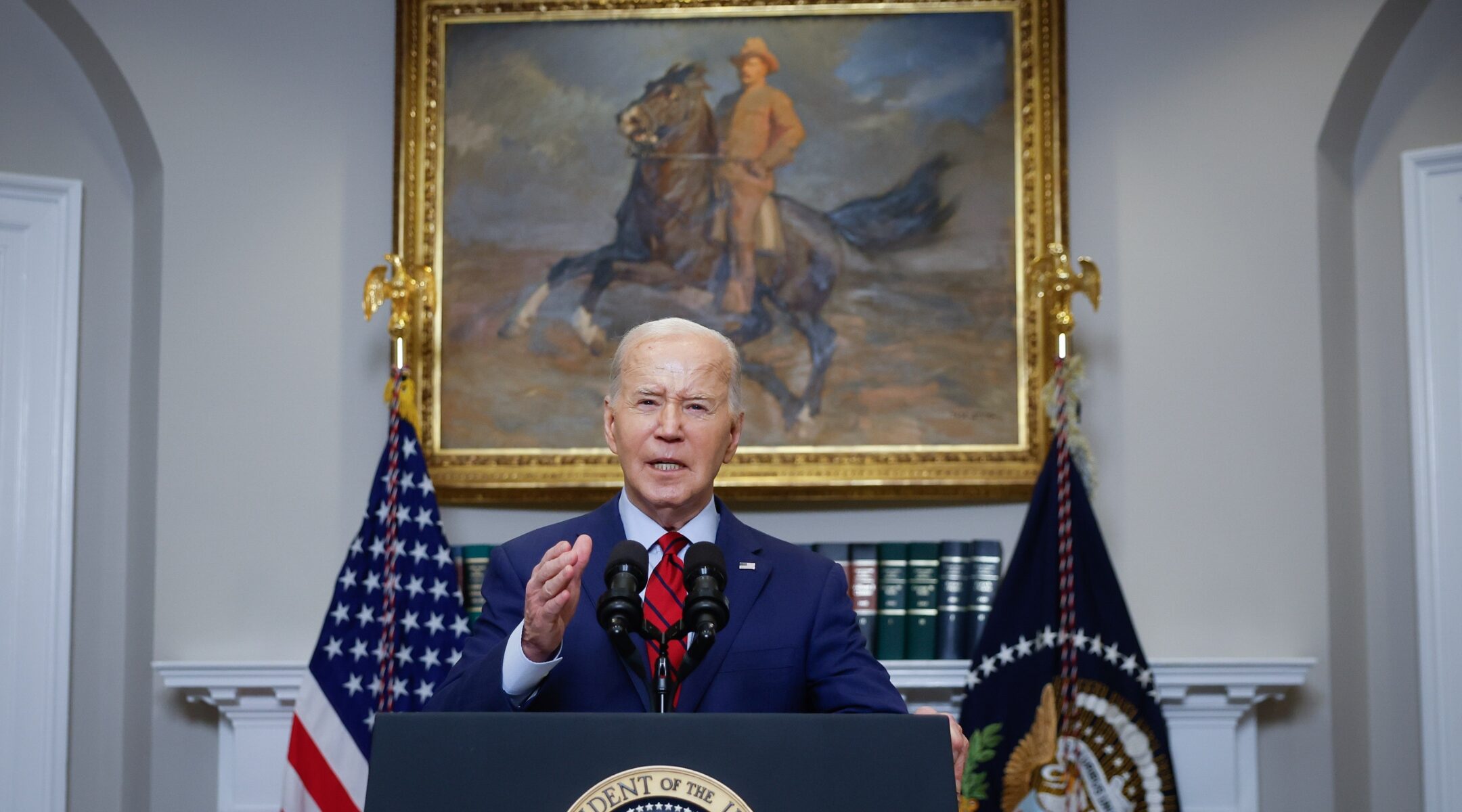WASHINGTON (JTA) — At first glance, the chalkboard sign looked like any of the others standing in front of Washington D.C.’s many restaurants and cafes.
But instead of advertising espresso or sandwiches, this one — across the street from a federal government building — displayed only one thing: the number of Palestinians killed in Israel’s war with Hamas, along with the words “Remember the people of Gaza.”
When it was taken down earlier this month after being vandalized, that number had passed 34,000 — a statistic quoted often in pro-Palestinian advocacy. But what made the blackboard different from the campus protests and others across the country was that the people keeping it current worked for the Biden administration, which has largely supported Israel and armed it as it has fought Hamas in Gaza.
Nearly all of the federal employees behind such efforts have kept their identities hidden — including the relatively few Jews in the movement. But a landmark moment in internal Jewish dissent came on Wednesday, when Lily Greenberg Call, special assistant to the chief of staff at the Department of Interior, announced that she was resigning in protest of President Joe Biden’s Israel policy — the first Jewish staffer among the several who have publicly resigned since Oct. 7.
“I can no longer in good conscience represent this administration amidst President Biden’s disastrous, continued support for Israel’s genocide in Gaza,” Greenberg Call, 26, wrote in her resignation letter, which she submitted to Secretary of the Interior Deb Haaland and shared on social media.
Greenberg Call, 27, attended Jewish day school and was a leader of a pro-Israel group in college, at the University of California, Berkeley, that was affiliated with AIPAC, the Washington lobby. She has previously written publicly about her move to the left on Israel, saying in a 2022 Teen Vogue essay that she had begun to question the idea of unconditional support for Israel after getting to know Arabs and Palestinians, including through her work on political campaigns.
In her resignation letter, Greenberg Call said her family had come to the United States after escaping persecution in Europe and that she was concerned about rising antisemitism around the world now. But she said she did not believe the war aided in Jewish security.
“Israel’s ongoing offensive against Palestinians does not keep Jewish people safe — in Israel nor in the United States,” she wrote. “What I have learned from my Jewish tradition is that every life is precious. That we are obligated to stand up for those facing violence and oppression, and to question authority in the face of injustice.”

Lily Greenberg Call, as a teen leader in 2015: “Advocacy is not just a Band-Aid to cover and temporarily fix problems in society.” (Courtesy of the Jewish Community Foundation of San Diego)
While Greenberg Call is the first Jewish Biden administration staffer to resign publicly over the war, others in her movement say she isn’t alone in her sentiments. In memos, in internal staff meetings, and in occasional bursts of public protest, a cadre of mid-level D.C. bureaucrats is dissenting from the Biden administration’s backing for Israel in the war. They describe crushing disappointment in an administration that they feel is committed to defending innocents from carnage elsewhere — most notably in Ukraine — but not, they say, in Gaza.
“There is nothing more American than the right to free speech and free assembly,” said a May 3 statement from Biden-Harris Administration Staffers for Ceasefire, an ad hoc group formed soon after the war broke out.
The staffers say they have moved the needle a bit on policy — citing the increased flow of humanitarian aid to Gaza as an example — though they wish they’d had more impact. But their critics in the administration say their influence is negligible.
Those making the actual decisions say the dissent is background noise and that factors stemming from the crisis — and not the protests — are behind shifts in policy.
“These are people who are not involved in the policy discussions,” said a federal official who has a seat at the policy making table, “who are not in the room to hear senior-level policymakers make the case for both humanitarian assistance and describe what our expectations are when it comes to avoiding civilian harm and preventing violations of laws.”
The clandestine pro-Palestinian organizing began shortly after Hamas’ Oct. 7 invasion of Israel, which killed approximately 1,200 people and launched the war. As Israel began counterstrikes, heads of various departments convened meetings to air concerns about Biden administration policy. Soon, S, a Jewish staffer who is part of the activist movement, was spearheading one of a number of letters to top Biden administration officials that called for a ceasefire.
An Oct. 20 letter from Jewish and Muslim congressional staff calling for a ceasefire represented an early public action. A letter sent to Biden in November ultimately garnered a thousand signatures, and a White House vigil took place in December. Discussion of others has not abated.
“Word of mouth and WhatsApp are pretty active,” S said.
Another convening point has been the Instagram account Dear White Staffers. Established in 2020 by an anonymous congressional staffer to post examples of how colleagues of color face discrimination, the account turned after Oct. 7 to decrying Biden’s war policies. The account has posted anonymous comments from administration staffers alongside news articles and calls to action such as alerts about D.C.-area pro-Palestinian protests. On Wednesday, it directed followers to Greenberg Call’s resignation letter.
P, a staffer for a congressional Democrat, joined one of the Jewish-led vigils in the Capitol that led to arrests. Contacts he forged through helping to set up the first union for congressional staffers helped lead to the letter from Hill staffers a few weeks later.
“We have continued to show up and speak at large rallies and marches,” he said.
S and P asked to be identified only by first initials in order to avoid professional repercussions. The Jewish Telegraphic Agency has verified their identities and their staff positions. Jewish groups that have organized ceasefire protests, including the anti-Zionist group Jewish Voice for Peace and IfNotNow, confirmed that they are among the groups’ active participants within the government.
IfNotNow distributed Greenberg Call’s resignation letter on Wednesday.
The Jewish activists who spoke to JTA believe they are among the few Jewish voices in the movement because of the pressures pro-Palestinian Jews feel from their communities at home. Others in the executive branch support Biden’s position.
“I definitely feel like I’m one of the only Jewish voices in the group chats,” said S.
The dissenters point to Biden’s increased pressure on Israeli Prime Minister Benjamin Netanyahu to allow in humanitarian aid to the Gaza Strip, and measures to hold accountable alleged Israeli perpetrators of abuses, as evidence they made a difference.
But Julie Fishman Rayman, the American Jewish Committee managing director, said the dissenters have had more of an impact on the media than on actual policy in the government or in Congress.
She noted that one of their key demands — a unilateral Israeli ceasefire — has not found support in the executive branch, or in Congress, where the majority of lawmakers calling for a ceasefire have insisted that it must be mutual and include a release of hostages.
“There are people who from the get-go were starting these calls for a one-sided ceasefire,” she said. “If they were reading the fine print here, they would see that argument has not gained any currency.”
A congressional staffer told JTA that the flood of calls from constituents opposing the war had been more influential than the internal dissenters. “They are way less impactful than a bunch of angry constituents who are calling day in and day out and are better organized,” the staffer said.
Asked for comment, a State Department official referred JTA to remarks recently by spokesman Vedant Patel, when he was asked about the resignation of Hala Rharrit, the spokeswoman for Arab media. Rharrit quit over Gaza policy, saying State Department staff were afraid to speak out in dissent. (At least one other staffer has publicly resigned from the department, while a Palestinian American staffer at the Department of Education resigned publicly in January.)
Secretary of State Antony Blinken “reads every single one of those dissent channel cables and dissenting viewpoints from across the administration,” Patel said. “We continue to welcome them and we think that it helps lead to stronger, more robust policy making.”
Whether or not the internal protests are making a difference, pro-Palestinian activists say they are meaningful.
“Congressional and administration staffers have joined Palestinian solidarity marches, written dissent cables, signed open letters of disapproval, and in some cases publicly resigned,” Beth Miller, the political director of JVP Action, the political advocacy affiliate of Jewish Voice for Peace, told JTA. “Such public expressions of protest from people who are usually unwilling to do so should be a dire warning to the Biden administration to change course.”






